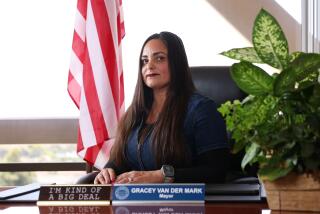N.Y. union seeks to curb teacher data
- Share via
NEW YORK — The New York City teachers union argued Wednesday before the state Supreme Court that the nation’s largest school district should not follow through with its plan to disclose evaluation information about some 12,000 teachers by name, saying it could do serious harm.
The union filed a lawsuit this fall to stop the New York City Department of Education from turning over teachers’ performance data to five New York news organizations that had filed requests for the information under the state’s Freedom of Information Law.
The case follows the Los Angeles Times’ publication of about 6,000 individual teacher ratings based on student test scores obtained from the Los Angeles Unified School District, which fueled a national debate over how teacher effectiveness should be measured and whether the results should be disclosed to the public.
Attorneys for the schools and local news organizations argued during the hearing Wednesday that the city had no choice but to comply with the public records law.
“Because it’s information generated by the government, it can’t be protected,” said Jesse Levine, the education department’s attorney, adding that public employees essentially lose their right to privacy because they work for the taxpayers.
In the past, New York has provided similar performance information to the media without identifying teachers. But in a letter this fall to school employees, New York schools Chancellor Joel Klein wrote that, prompted by similar data published in The Times, the New York media “have requested the names of individual teachers, not just the statistics,” and that the school system had to comply.
In New York, that information would include so-called valued-added performance scores for 12,000 of the system’s 80,000 teachers. Under that approach, a teacher’s effectiveness is measured by looking at how his or her students’ performance on standardized tests improves or declines from one year to the next. It largely controls for socioeconomic disparities.
The reports compare teachers of fourth through eighth grades -- the grades during which state math and English tests are administered -- and then predict whether the students’ achievement will improve.
The United Federation of Teachers insists that this formula is highly subjective and flawed, and that disclosure would violate teachers’ privacy.
“The city of L.A. did this and a teacher jumped off a bridge,” said Charles Moerdler, an attorney for the United Federation of Teachers. “Do we want that?”
Moerdler was referring to the suicide of a schoolteacher weeks after the ratings were released by The Times, not by the city. Although Los Angeles teachers union officials and family members have speculated that the scores were a factor in the suicide, no evidence to support that assertion has been made public.
Klein has said that New York City’s value-added approach “is not etched in stone,” but he and other educators across the country are pushing to use similar measures.
A decision on disclosing the New York data is expected after the holidays.
--
More to Read
Sign up for Essential California
The most important California stories and recommendations in your inbox every morning.
You may occasionally receive promotional content from the Los Angeles Times.










